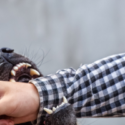First Aid for Dog Bites

When we think of dogs, we often picture man’s best friend: cute, fluffy tail-wagging, face-licking animals. Unfortunately, not all dogs are so nice. Sometimes, dogs bite. Whether due to prior abuse, lack of care, accidental playing, or personality, dog bites can be serious and lead to severe injury and blood loss. It is important to know what to do when you or a loved one has experienced a dog bite. Here are three things to do if you are bitten by a dog.
1. Treat the Injury
Aside from getting yourself to a safe location so that there is no longer an imminent threat, one of the most important things to remember if you are bitten by a dog is to treat the injury immediately in order to reduce your risk of infection. If the bite is minor, you will probably be able to treat it at home, but if you assess it and find that the injury is more severe, it is important that you seek professional medical attention. Furthermore, if you feel unnerved after the incident, you may want to call for help rather than driving yourself to the doctor or emergency room. If the area becomes warm, red, swollen, or tender to touch, if you are running a fever, cannot remember your last tetanus shot, or feel disoriented or faint, seek medical attention immediately. Also seek medical attention immediately if the dog bite does any of the following:
- Leaks pus or fluid
- Will not stop bleeding
- Causes severe pain
- Is caused by a dog that is unknown to you, not up to date on its vaccinations, or behaving erratically
- Causes loss of function
- Exposes muscles, tendons, or bone
2. Prevent Infection
After you have administered first aid, you also want to be sure that you take precautions to prevent infection. If the bite did not break the skin, you should still wash the area with soap and warm water. If you have it on hand, you may also want to apply antibacterial ointment to be extra cautious. If your skin is broken, do the above with soap and warm water but gently press on the wound a bit to get out a little blood out of the area to expel any germs that have accumulated in the area. If you are already bleeding, using a clean cloth, gently press down on the wound in order to help stop the bleeding. Then apply antibacterial ointment, cover it with a sterile bandage, and see your doctor.
3. Find Out Relevant Information About the Dog’s Medical History
Once you get the injury under control, if the owner is nearby, it is very important that you find out about the dog’s medical history, specifically whether or not it has been inoculated against rabies. Also make sure that you ask the owner for his or her information including name, telephone number, and the veterinarian’s information. If you are able to, ask to see the owner’s identification. But if the owner is not present, be sure to ask any witnesses if they have seen where the dog lives. Also be sure to remain up-to-date with your own dog’s inoculations in case he or she is responsible for biting someone. Any dog is capable of biting — even the nicest ones.
The Attorneys at Mintz Law Firm Help Those in Colorado Who Have Been the Victim of a Dog Bite
At Mintz Law Firm, we do not take dog bites lightly. We understand the physical and often emotional and financial damage that they can cause. We work with our clients, striving to achieve the best possible outcome for each situation and to get them what they deserve. To learn more or schedule a free consultation, fill out a contact form or call us at 303-462-2999 today!
